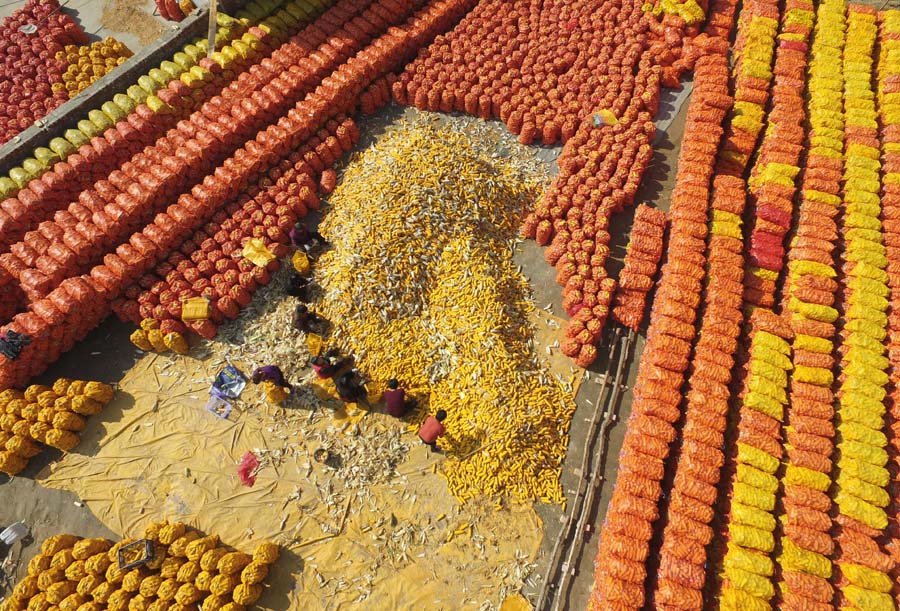China’s Suggestions on Food Security

October 14, 2019 was World Food Day, on which the Chinese government released its second white paper on food security, summarizing the historic achievements and experiences of new China in food security over the past 70 years, and reaffirming China’s national food security strategic propositions and practices in the new era. The document also clarifies China’s firm position and solemn commitment to participate in and promote global food security governance.
Safeguarding food security is a development goal pursued by all mankind. The Food and Agriculture Organization of the United Nations (FAO) proposed the concept of food security in the 1970s. The World Food Summit held in 1996 in Rome proposed to halve the number of hungry people by the year 2015. At the United Nations Sustainable Development Summit in 2015, the 2030 Agenda for Sustainable Development was issued, which aims to achieve the goal of zero hunger globally by 2030.
Eliminating hunger, malnutrition, under-nutrition, over-nutrition and hidden hunger is the common consensus and goal of the international community. Supplying international food aid, building a global food security governance system and exploring international exchange of food security experience are regular methods employed by the international community to combat hunger. Such activities are also common with the FAO. Hunger is often intertwined with poverty. Poverty eradication and economic development are also missions of institutions such as the World Bank and the International Monetary Fund. Direct and indirect international cooperation in food security is an important component of international affairs.
In general, international cooperation on food security has been continuously promoted. However, it has also encountered frequent interference from various factors, leaving extremely uneven development in food security, which remains complicated and difficult to solve.
Different countries have contrasting agricultural resource endowments. Their levels of agricultural development and public demands are also very different. As a result, the world has both food surplus countries and food shortage countries. Some economically developed and over-settled countries often impose political demands on low-income food-deficient countries for food aid. Due to excessive conditions imposed by economically developed countries with surplus food or imposition of sanctions and blockades on other countries, low-income food-deficient countries often cannot effectively receive international food aid. Alternately, leaders set aside public sentiment and their national conditions to promote politics friendly to food aid countries, which domestically leads to unrest and even civil war and regional conflicts. In such cases, the food security situation of ordinary people is not improved, but only worsened. Today, the hundreds of millions of hungry people in the world are mainly concentrated in low-income food-deficient countries.
Effective mechanisms for world food security cooperation have not yet been established completely. It has been difficult to coordinate countries in coping with the global food crisis. In 2008, a serious global food crisis struck. Southeast Asian countries, in particular, suffered from insufficient rice supply due to natural disasters and years of neglect of food production. They banned rice exports for their own food security. At the same time, other countries with excessive food supply were using large amounts of food for bio-energy processing for economic benefits. This resulted in skyrocketing food prices in the international market. Many low-income and other vulnerable groups in developing countries were unable to afford the high prices of food.
How can we organize effective international cooperation on food security that ensures countries assume responsibility for food security? Can we apply successful experiences in solving food security in food-deficit countries to better help them? China’s food security white paper highlights some of China’s proposed strategies.
The white paper emphasizes the strategic positioning of national food security as a top priority. It fully demonstrates that, as the world’s largest developing country and a responsible large country, China has always been a positive force contributing to global food security. Chinese food security is mainly based on its own strength, and it is never predicated on damage to other countries and global food security. China’s scientific and technological progress in the field of food security and experience in combining poverty alleviation and hunger elimination have unconditionally been promoted in needy countries around the world. China actively participates in governance of world food security and provides international emergency food assistance within its capabilities and without any conditions attached.
Publication of China’s food security white paper will not only guide the country’s future work in the arena, but also help the world understand China’s strategies for food security and provide Chinese experience for food-deficient countries as part of its efforts to build a community with a shared future for humanity.
The writer is a researcher at the Rural Development Institute under the Chinese Academy of Social Sciences.
